Iran’s Police Kick Off Camera Surveillance To Catch Women Without Hijab

Iranian police has begun its new plan of using "smart" technology in public places to identify and then prosecute women who do not wear hijab.

Iranian police has begun its new plan of using "smart" technology in public places to identify and then prosecute women who do not wear hijab.
As previously announced, law enforcement forces Saturday intensified their efforts to track teenage girls and women who do not wear ‘proper’ hijab in streets, shopping centers and cars.
In a statement last week, police threatened that they would take action to identify those breaching the regime laws by using tools and smart cameras in public places and thoroughfares.
According to the statement, the move is aimed at “preventing resistance against the hijab law,” adding that such resistance against the strict Islamic dress code tarnishes Iran's “spiritual image” and spreads insecurity.
Meanwhile, Ahmad-Reza Radan, the chief commander of Iran’s police, said that the forces under his command will use advanced technology and equipment to identify people who do not observe the mandatory hijab in public places. Women and girls who do not wear scarves in "public places, cars or commercial centers" will be prosecuted, he added.
The uprising that was sparked by the death in ‘hijab police’ custody of 22-year-old Mahsa Amini has made it increasingly difficult to enforce the mandatory Islamic dress code. Appearing in public without a full veil has become a common sight even in small and more conservative towns.
The Islamic Republic, founded in 1979, is the only Muslim country other than the Taliban-ruled Afghanistan with such a strict interpretation of hijab and nationwide coercive measures for its observance.

Many Iran watchers believe that one of the main reasons for the nationwide protests was that people have lost their hope and confidence in the future of their country.
The former head of the Tehran City Council Mohsen Hashemi has said this week that lack of hope and trust in the future was a factor in the ferocity of the protests.
Prominent sociologist Mohammad Fazeli has also said that hope in the future of Iran has weakened among the public and this casts a shadow of doubt on any solution that the government might offer for long-standing problems.
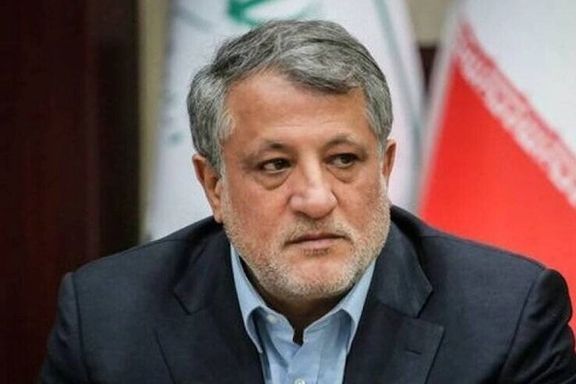
Pundits from the two extremes in the Iranian political landscape, reformist commentator Abbas Abdi and conservative pundit Mohammad Mohajeri spoke to Tejarat Farda magazine’s issue published in late March about the outlook of Iran's political landscape as the new Iranian year began. The magazine's editor Sadaf Samimi concluded that their views about the future of Iran and what happened last year are strikingly similar.
Abdi opined that the Islamic Republic was under pressure from the protests and the foreign-based opposition.
"I believe the next two years will definitely bring about major changes in Iran." He did not expand on the nature of those changes but said, "Iran has many potentials for improvement, but this does not mean that today's official policies can continue."
Mohajeri said that last year's protests created a very good opportunity for the Iranian regime. Although the protests were threatening the regime, they also signalled dangers that alerted the regime. Mohajeri added that Iranian officials attributed the protests to the intervention of foreign countries, but they realized that the protests have their roots inside the country.
He observed that previous protests in Iran were motivated by economic problems, but this time there was no talk of the economic grievances among the protesters.
"Although everyone knew that there were problems relating to the people's livelihood, and nearly all of those arrested during the protests were coming from the lower strata…the main problems the protesters were concerned about were political and cultural issues.”
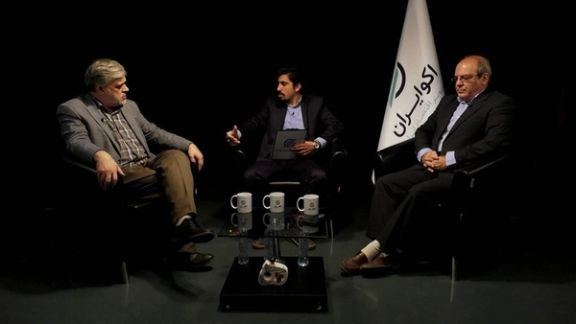
The two pundits however agreed that the receding of street protests did not mean that the movement is over. Anything can re-ignite the protests, they said.
Abdi said it is essential that major changes take place in Iran during the next two years, but the Iranian government seems incapable of problem solving. This is a government that does not accept even clear facts such as rising meat prices and in one instance banned a newspaper that published the news. The first thing that should be reformed in Iran is the media, he said that even do not cover recent gas attacks on girls' schools.
On the other hand, the government is not aware of the impact of international reporting, such as CNN's report on torture in Iranian prisons, Abdi said. More competitive election and equality before the law are essential to restore a semblance of normality.
Mohajeri said the people have lost their trust in the government so that even if it disseminated factual news, still people would not believe the government. This trust has been lost over many years.
He said, When the officials promise that the rate of exchange and market prices will come down but the opposite happens, the people have every right not to believe them again. He added: Although I believe the officials have realized the truth following the protests, I still have not received a signal that would indicate the likelihood of an improvement in the next year.
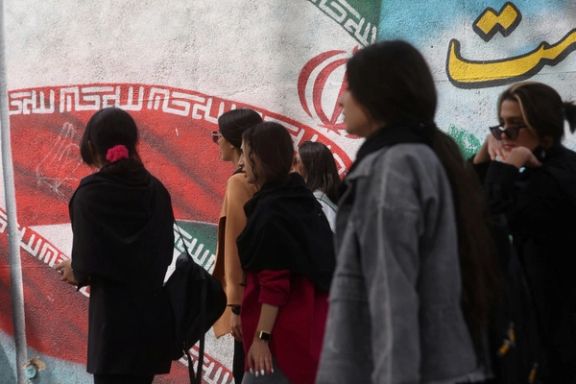
A group of UN human rights experts said Friday that Islamic Republic’s repressive measures to enforce hijab epitomize gender-based persecution.
The experts argued imposing compulsory veiling on girls from the age of seven at the start of elementary school are a manifestation of gender-based persecution and would lead to unacceptable levels of violations of the rights of women and girls in Iran.
The group is comprised of Javaid Rehman, UN Special Rapporteur on the Situation of Human Rights in Iran and four other special rapporteurs.
“It is deeply worrying that after months of nationwide protests, including against restrictive hijab laws, and following the death of 22-year-old Mahsa Amini in the custody of the morality police, Iranian women are increasingly facing harsh and coercive measures by State authorities,” the UN experts said.
The uprising that was sparked by the death in police custody of Amini has made it increasingly difficult for the clerical regime to enforce the mandatory Islamic dress code. Appearing in public without a full veil has become a common sight even in small and more conservative towns. Since the beginning of the ‘Women, Life, Liberty’ movement in September last year, thousands of girls and women have set fire to their headscarves in a symbolic move and voiced opposition to compulsory hijab.
To avoid the public backlash over the violent enforcement of hijab laws, the Islamic Republic has recently begun implementing a wide range of measures from public humiliation tactics -- such as preventing women without hijab to enter subway stations and public places -- to using traffic cameras to identify hijabless women.
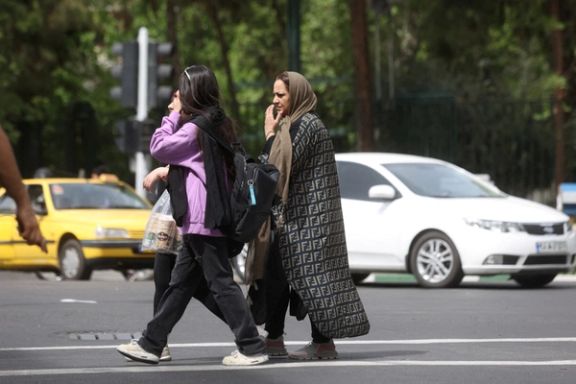
The authorities seek to enforce hijab through new methods and announced that women who unveil in public will be deprived of social services such as cellphone lines and mobile internet access. The new punitive measures also include blocking the bank accounts of women and impounding cars in which women remove their hijab.
The situation is extremely grave for students because all the education centers are controlled by the regime, and they can easily be expelled or suspended if they disregard mandatory hijab. The Ministry of Education has also announced recently that educational services will not be provided to students who do not comply with the rules of “chastity and hijab” – undermining their fundamental right to education.
The government can also ban women who unveil from leaving the country and exclude them from government or public positions for not observing its strict interpretation of the Islamic dress code.
The Islamic Republic, founded in 1979, is the only Muslim country other than Taliban ruled Afghanistan with such a strict interpretation of hijab and nationwide coercive measures for its observance, while Islam is the official religion in 26 countries in Asia, sub-Saharan Africa, North Africa, and the Middle East.
Decrying the compulsory veiling laws that are enshrined in Iran’s penal code, the UN experts pointed out that such laws allow authorities to subject women to arbitrary arrests and detentions, and deny them access to public institutions, including hospitals, schools, government offices and airports, if they do not cover their hair.
“These additional repressive measures would further exacerbate the negative impact of the compulsory hijab laws. Criminalizing refusal to wear the hijab is a violation of the right to freedom of expression of women and girls and opens the door to a range of other possible violations of political, civil, cultural and economic rights,” they said.
The rules extend to managers and business owners, who will effectively act as “police” to enforce the compulsory veiling in the event of non-compliance by female employees.
“These restrictive measures and repressive policies that do not rely on laws or legal process, but on enforcement by a range of State authorities and private actors are at the heart of the State's control over the public and private lives of its citizens, particularly women and girls. These draconian measures impose de facto social and economic paralysis on women who refuse to comply with these laws,” the experts said.
Although it may seem futile to Iranians, the UN experts concluded their statement by a call on the authorities to amend the Constitution, repeal existing gender discriminatory laws, and abolish all regulations whereby women's dress or behavior in public or private life is monitored and controlled.
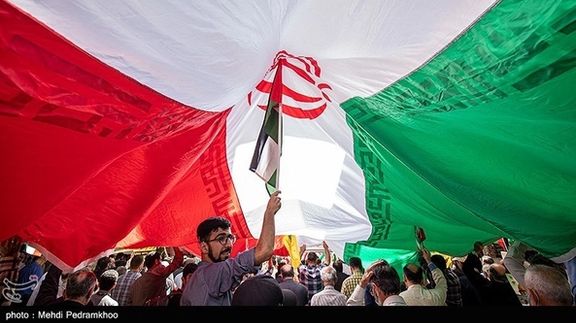
The Islamic Republic held its annual anti-Israel rent-a-crowd parade Friday, reiterating threats against regional countries over normalization of ties with Israel.
The state-sponsored event is held guised as defending the rights of Palestinians but serves as a phenomenon to perpetuate antisemitic and anti-Israel propaganda among the Muslim world under the auspices of a collective cause propagated by Iran's dictator.
The day, which takes its name from the Arabic-language name for Jerusalem, is often described as the official demonstration in support of the Revolutionary Guards Quds (Qods) Force – an IRGC division primarily responsible for extraterritorial military and clandestine operations – because it seeks to justify the Islamic Republic’s destabilizing activities across the region.
Directed against Israel’s existence, Al-Quds Day was proclaimed by the founder of the Islamic Republic Ruhollah Khomeini on 7 August 1979. He called on Muslims worldwide to unite in solidarity against Israel and in support of the Palestinians, saying the "liberation" of Jerusalem was a “religious duty to all Muslims”.
Among the most salient programs during the day is burning the flags of Israel, the United States, the UK and other countries that the Islamic Republic deems as enemies, no matter their role in the conflicts between Israel and Palestinians. Effigies of Western officials in chains are also among the sights of the regime’s carnival of hate.
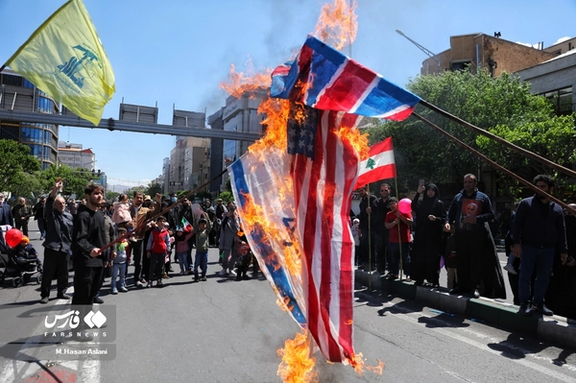
Almost all the regime’s insiders are socially obligated to attend the event as a renewal of allegiances with one of the main foreign policy issues of the Islamic Republic, the destruction of the State of Israel.
The president and his cabinet ministers as well as members of the parliament, prominent politicians and their entourage and so many other officials from the inner circles of the regime are usually seen during the rallies.
Such state-sponsored events are usually shunned by the general public and the regime ends up transporting paramilitary Basij forces and its supporters from small towns to provincial capitals to form demonstrations with large crowds for the façade of mass support.
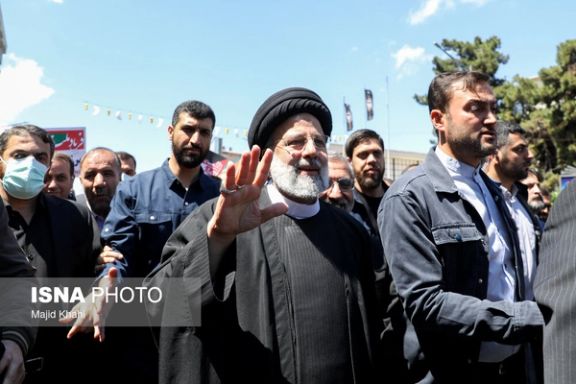
As he was walking along his large retinue while people were chanting "Death to America" and "Death to Israel" around him, President Ebrahim Raisi spoke to reporters, emphasizing that “the collapse of the Zionist regime is very close”. Repeated relentlessly with a sense of spiritual foreboding by the Supreme Leader and his cronies, Israel is ironically about to celebrate its 75th year. According to Khamenei’s prophecy, Israel has 17 years left until its downfall.
Raisi reiterated that the liberation of Quds (Jerusalem) is imminent; “Closer than you can imagine,” adding that “the normalization of relations with regional states [such as the United Arab Emirates and Bahrain] has not brought and will not bring security for the Zionist regime.”
Parliament Speaker Mohammad Bagher Ghalibaf delivered the final speech of the event at Enqelab (revolution) Square after droves of people were guided to the final venue from 10 routes designated for the rallies throughout the capital Tehran. As it was expected, he emphasized that resistance is the only way to achieve success and ultimate victory over Israel.
“Quds Day is a very significant and influential day for the Muslim Ummah and Islamic countries,” he said. “Quds Day indicates that success and victory could be attained only through resistance”. Ghalibaf also lauded recent Iran-backed Palestinian missile strikes into Israel from Gaza, Lebanon and Syria, saying all Palestinian groups have closed ranks to liberate al-Quds (Jerusalem), which he described as the capital of the Muslim world.
The Islamic Republic is so invested in the idea of resistance that it calls its proxy forces and aligned militia across the region “the axis of resistance,” mainly organized by the IRGC’s Quds force. Its current commander Esmail Qaani was also present in the rallies and photos and banners of his predecessor Qassem Soleimani – killed January 2020 by a US drone attack in Baghdad — abounded throughout the event.
The IRGC’s commander-in-chief Hossein Salami also delivered a speech at the event, claiming that Israel is on the brink of destruction, and that it cannot prevent the arming of Palestinians in the West Bank, referring to the likes of Hamas and Islamic Jihad, which openly admit funding from and affiliations to Iran.
“There are operations in the West Bank and Tel Aviv, and the regime that surrounds itself like a barracks and has the strongest and most modern security systems cannot prevent the arming of the West Bank and the operations of the Palestinian forces,” he said.
This year, the Islamic Republic also released a communiqué at the end of the event – dubbed the Quds Day Resolution – threatening states that have restored relations with Israel, a veiled warning against Saudi Arabia and its allies which are bolstering ties with Jerusalem.
The regime in Tehran, which is in the middle of rapprochement with Riyadh, did not directly mention Saudi Arabia in its Quds day statement, and prevented people from chanting slogans against the Al Saud, a prevalent motto in previous years.
As the regime continues to fight a losing battle against the tide of hijab rebellion, a trigger for months of violent unrest in the country, the day’s final statement reiterated the regime’s rhetoric that the “hijab is one of the necessities of Islam, and not observing it is a religious and political haram and will cause the foundations of families to weaken.”

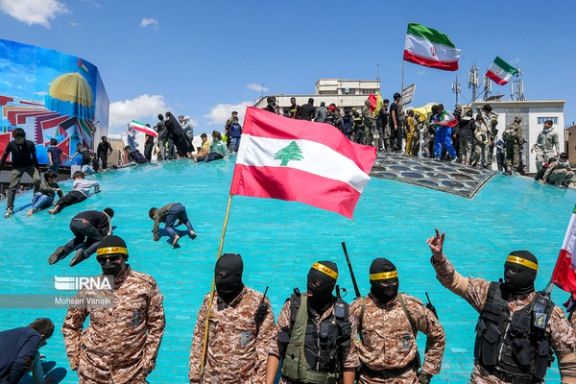
With divine grace, soon there will be nothing called the “Zionist regime”, the chief staff of the Iranian armed forces said Friday, as the government marked Quds Day.
In an announcement carried by local media, the armed forces of the Islamic Republic said that “countdown for the disintegration of Zionism has begun.”
In official jargon used by the Iranian regime, Israel is called “the Zionist entity” or the “Zionist regime.” In its 44-year history Iran’s clerical rulers have been calling for “eradication” or “destruction of Israel.”
In 2015, Iran’s ruler Ali Khamenei announced that Israel would cease to exist in the next 25 years and in 2016, the regime put up a countdown clock in Tehran’s Palestine Square that showed time ticking. This followed the signing of a nuclear agreement between Iran and World powers in July 2015.
Iran’s armed forces said, “Seventy-five years has passed since the occupation of Palestinian lands with a conspiracy by evil Britain and the American mafia regime,” and called for Muslim unity in supporting Palestinians.
Iranian officials have become vociferous in the past few weeks, calling for Palestinians to attack Israel and insisting that Jerusalem “will be soon liberated.” This followed the political rift and protests in Israel over Prime Minister Benjamin Netanyahu’s quest to overhaul the judicial system.
Palestinian attacks followed both from Gaza and Lebanon, triggering Israeli responses in a series of military tit-for-tat confrontations.
“The countdown has begun for Zionism’s downfall,” the statement said, adding that “with God’s grace soon there will be nothing called the Zionist regime.”
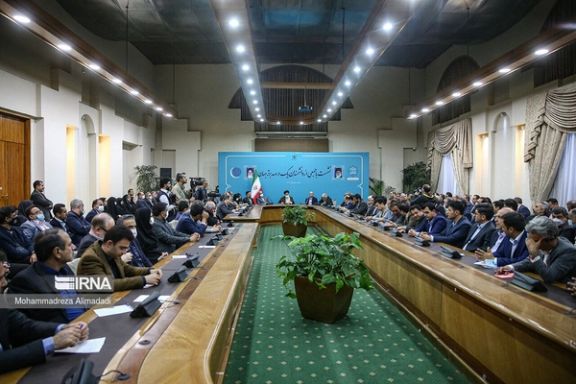
A university professor’s uninformed claim that the Python software program can 'predict the future' has caused new embarrassment for the government in Iran.
A one-minute video emerged Wednesday of a March 28 meeting between President Ebrahim Raisi and academics allegedly in the “top one percent of world scientists” during which one of the participants makes hugely uninformed remarks while the president listens with interest and takes notes.
The meeting was apparently organized by the ministry of science, research and technology and over 100 of the “top one percent [Iranian] scientists” attended.
University professor, Davood Domiri-Ganji, suggests to the president that the “Python universal software” and “Python global network” could be used to predict the future in the fields of medicine, military, and economic developments such as the growth of inflation “in the next four years”.
The mistake does not appear to be a slip of the tongue as Domiri mentions it several times and even claims that there is artificial intelligence “inside” the human body.
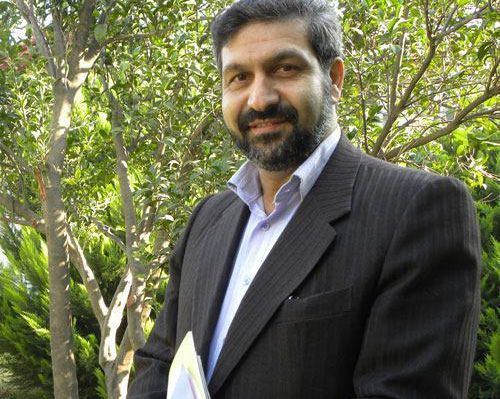
Domiri-Ganji’s major gaffe, apparently mistaking the Python computer programming language for artificial intelligence, has caused an uproar in the media and social media, even pushing the word Python to the top of Persian language hashtags on Twitter.
“These vulgar remarks angered many because everyone knows that Python is a simple programming language … but not everyone knows what inflation is or what shapes the rate of foreign currency exchange,” Sadegh Alhosseini, a prominent economist, said in a tweet while warning about the consequences of giving such uninformed individuals a role in policymaking.
Domiri-Ganji, is a mechanical engineer, a former head of Amol University of Special Modern Technologies and the National Elites Foundation of Amol. He is currently a professor and research deputy at Babol’s Noshirvani University. According to Iranian media, Domiri-Ganji has close ties with the hardliner political establishment and media. According to his Google Scholar page, he has published dozens of scientific articles.
The issue is not just the uninformed suggestion of the said professor, former Iran newspaper journalist Ehsan Bodaghi who dubbed the incident as “Python-Gate” said on Twitter. “Even worse is the fact that there wasn’t even one person among all those ‘top one percent of world scientists’ to know what Phyton is and to point out that it was nonsense.”
Bodaghi has also pointed out that this incident and other cases when hardliners have made hugely uniformed remarks, or carried out scientifically baseless projects with government money, are the result of involving ideology and politics in technical and scientific matters. “The outcome is the circumstances we are witnessing now,” he wrote.
One of the cases that Bodaghi and many others have mentioned is the claim of invention of Corona virus detector in early 2020 by the Revolutionary Guards (IRGC). The machine which was presented to the public by the IRGC Commander-in-Chief Hossein Salami in April 2020 at a televised ceremony appeared to be only a fake bomb detection device that was first sold by James McCormick, a British fraudster, to Iraqi security forces.
“There are still many honorable, knowledgeable, patriotic and ethical individuals in Iranian universities but in a symbolic manner, Python-Gate is indicative of the decline that has overtaken universities,” said Mohammad Fazeli, a former professor of sociology at Shahid Beheshti University who was expelled for political reasons in a tweet Wednesday.
“No-one knows of this decline and is aware of the procedures leading to its existence better than academics themselves,” he added. Coining the word “Pythonism” to refer to uninformed and pseudoscientific theories that are put to action by the authorities, Fazeli warned that such theories are gaining traction and forming the basis of policymaking in Iran.
Python-Gate has also sparked a host of jokes on social media. “One should use Python to look at the next four years to see if these mullahs are going to be gone by then or not,” one tweeter wrote.